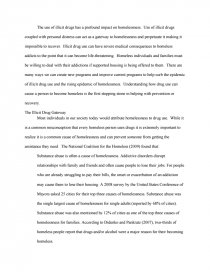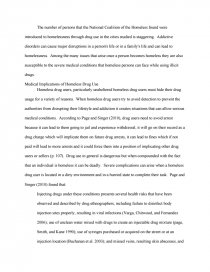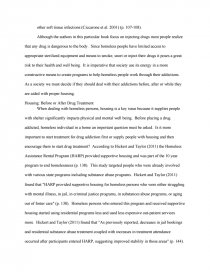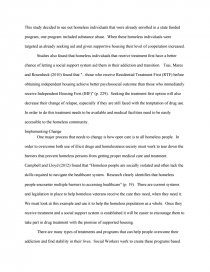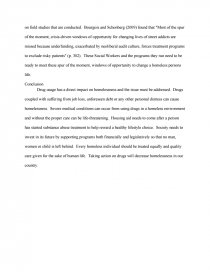The Impact of Drugs on Homelessness
Essay by George • March 23, 2013 • Research Paper • 1,516 Words (7 Pages) • 1,477 Views
The use of illicit drugs has a profound impact on homelessness. Use of illicit drugs coupled with personal distress can act as a gateway to homelessness and perpetuate it making it impossible to recover. Illicit drug use can have severe medical consequences to homeless addicts to the point that it can become life-threatening. Homeless individuals and families must be willing to deal with their addictions if supported housing is being offered to them. There are many ways we can create new programs and improve current programs to help curb the epidemic of illicit drug use and the rising epidemic of homelessness. Understanding how drug use can cause a person to become homeless is the first stepping stone in helping with prevention or recovery.
The Illicit Drug Gateway
Most individuals in our society today would attribute homelessness to drug use. While it is a common misconception that every homeless person uses drugs it is extremely important to realize it is a common cause of homelessness and can prevent someone from getting the assistance they need. The National Coalition for the Homeless (2009) found that:
Substance abuse is often a cause of homelessness. Addictive disorders disrupt relationships with family and friends and often cause people to lose their jobs. For people who are already struggling to pay their bills, the onset or exacerbation of an addiction may cause them to lose their housing. A 2008 survey by the United States Conference of Mayors asked 25 cities for their top three causes of homelessness. Substance abuse was the single largest cause of homelessness for single adults (reported by 68% of cities). Substance abuse was also mentioned by 12% of cities as one of the top three causes of homelessness for families. According to Didenko and Pankratz (2007), two-thirds of homeless people report that drugs and/or alcohol were a major reason for their becoming homeless.
The number of persons that the National Coalition of the Homeless found were introduced to homelessness through drug use in the cities studied is staggering. Addictive disorders can cause major disruptions in a person's life or in a family's life and can lead to homelessness. Among the many issues that arise once a person becomes homeless they are also susceptible to the severe medical conditions that homeless persons can face while using illicit drugs.
Medical Implications of Homeless Drug Use
Homeless drug users, particularly unsheltered homeless drug users must hide their drug usage for a variety of reasons. When homeless drug users try to avoid detection to prevent the authorities from disrupting their lifestyle and addiction it creates situations that can allow serious medical conditions. According to Page and Singer (2010), drug users need to avoid arrest because it can lead to them going to jail and experience withdrawal, it will go on their record as a drug charge which will implicate them on future drug arrests, it can lead to fines which if not paid will lead to more arrests and it could force them into a position of implicating other drug users or sellers (p. 107). Drug use in general is dangerous but when compounded with the fact that an individual is homeless it can be deadly. Severe complications can arise when a homeless drug user is located in a dirty environment and in a hurried state to complete their task. Page and Singer (2010) found that:
Injecting drugs under these conditions presents several health risks that have been observed and described by drug ethnographers, including failure to disinfect body injection sites properly, resulting in viral infections (Varga, Chitwood, and Fernandez 2006); use of unclean water mixed with drugs to create an injectable drug mixture (page, Smith, and Kane 1990); use of syringes purchased or acquired on the street or at an injection location (Buchanan et al. 2003); and missed veins, resulting skin abscesses, and other soft tissue infections (Ciccarone et al. 2001) (p. 107-108).
Although the authors in this particular book focus on injecting drugs most people realize that any drug is dangerous to the body. Since homeless people have limited access to appropriate sterilized equipment and means to smoke, snort or inject their drugs it poses a great risk to their health and well being. It is imperative that society use its energy in a more constructive means to create programs to help homeless people work through their addictions. As a society we must decide if they should deal with their addictions before, after or while they are aided with proper housing.
Housing: Before or After Drug Treatment
When dealing with homeless persons, housing
...
...
